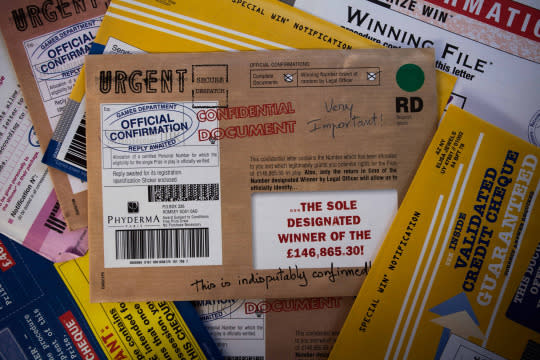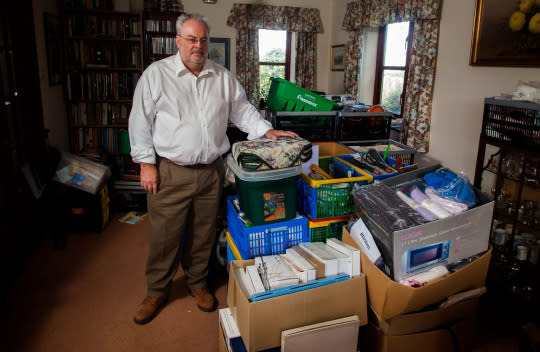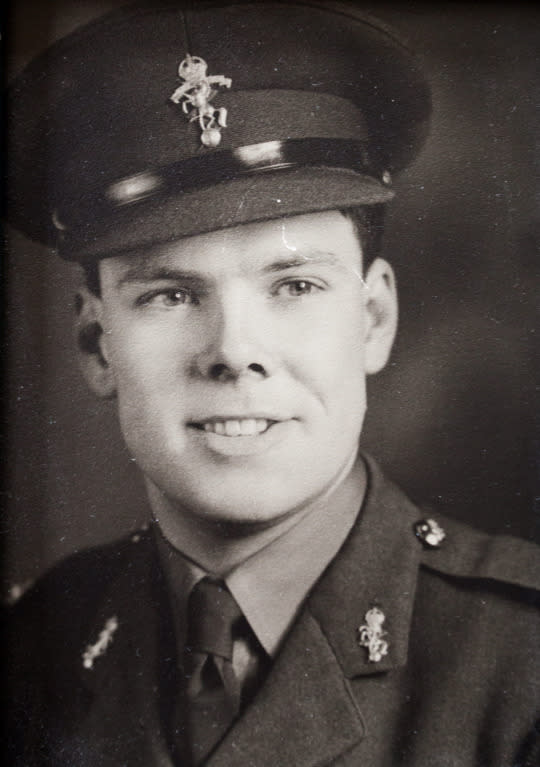Widower With Dementia Becomes Target Of £35k Fraudsters After Charity Passes On His Details 200 Times

A former Army colonel who suffered from dementia was conned out of thousands of pounds and hounded by firms after a charity passed on his details 200 times.
Samuel Rae completed a survey for a charity he supported but after the 87-year-old failed to tick a box that would forbid them from having his details shared, he was bombarded with pleas for money.
Many of the calls came from other charities looking for donations while some came from fraudsters who tried to convince him he had won huge sums of money.
After being contacted 700 times by 12 different firms, big hearted Mr Rae handed over a staggering £35,000 in total.
The shocking level of contact that Mr Rae endured was only discovered when his son, Chris, visited his home in Land’s End, Cornwall, and found hundred of scam letters.
He said “The way charities have treated him is absolutely disgraceful.
“If what they have done to my father is legal, then the law needs to change.
"I’m just appalled and deeply shocked.
"It is a horrific insight into what can happen when you forget - as we all sometimes do - to tick a box in the small print.”

Mr Rae spent 30 years in the Army before retiring but now suffers from severe dementia and is unable to recognise his own son.
He filled out a lifestyle survey in 1994 for a charity that no longer exists - and his information was passed on to other companies based on his answers.
He mentioned his pet cat in reply to one of the questions, and was then put on a list of ‘pet lovers’, and his name and address were sold.
His details were then purchased by two charities - the International Fund for Animal Welfare and the PDSA.
Both charities immediately contacted Mr Rae to ask for donations, and after recruiting him as a supporter, the PDSA sold his information onto other, less creditable, companies.
His details were obtained by a medical insurance company, a gambling company and a jewellery company, and even Prize Winners - a company run by serial mail conman Adrian Williams.
The scammers and the charities alike encouraged Mr Rae to enter lotteries and sweepstakes in the belief that he would win prizes.
Some charities even placed his personal details on lists of people who are deemed likely to respond to letters about sweepstakes.
These lists are referred to in the industry as 'suckers’ lists, and are a valuable resource to conmen. Mr Rae is thought to be on at least 11 of them.
Louise Baxter, manager of the National Trading Standards Scams Team, said that scam companies bought these lists knowing that people on it were vulnerable.
The PDSA was one of the charities which put Mr Rae’s details on such a list then offered for sale to others, including the charity Diabetes Research and Wellness Foundation (DRWF).

The DRWF put Mr Rae’s name on two other lists of its own, and went on to sell those two lists 107 times, including to ten scam companies.
One of the companies that bought the DRWF sweepstakes list was Biotonic, a catalogue scam firm which quickly bombarded Mr Rae with mail.
The letters he received claimed he had won a huge prize but needed to buy products from a catalogue to speed up the cheque.
Before long a confused Mr Rae had spent over £300, but the cheque for Biotonic never arrived.
Another scam company that bought the DRWF sweepstakes list was Best Of, who managed to scam Mr Rae out of almost £3,500.
In total Mr Rae’s details were passed on 200 times to 88 charities, including Unicef and the British Red Cross, and 12 scam firms.
With so many organisations targeting Mr Rae, he was inundated with mail and phone calls from scammers and charities alike.
The vulnerable widower openly trusted the charities which sold on his information, believing them to do the right thing.
His son Chris has now moved back in with his father to take care of him, and he now has lasting power of attorney for his father.
He blasted the companies who sold his details in the first place, saying: "The most shocking thing to me is the charities.
"You think charities would have the highest ethical standards of any organisations.
"It is clear to me that some of them have been taken over by people who only care about making money.
"In a way, I am glad my father is not able to understand what has happened.
“He belongs to a generation who just trusted charities to do the right thing.”

The PDSA said it had 'categorised’ Mr Rae on a list of people who were 'interested in competitions’ but denied that this was a 'suckers’ list.
It said that it obtained appropriate consents before providing supporters details to selected third parties and no longer shares such data.
Sarah Bone, chief executive of the DRWF, said the charity deals with “recognised list brokers or directly with charities who are fully compliant with the Data Protection Act and work within the guidelines of the Direct Marketing Association to ensure that we are exchanging, as far as we can be sure, with reputable organisations”.
She also said the charity would “take immediate and necessary action” if it found there was a cause for concern over the way it traded data.
Miss Bone added: “We regularly review our fundraising practices as it is our aim to adhere to good practice, particularly when it concerns the relationship which we enjoy with our supporters, and we are currently going through this process.”
Chris, who uncovered the scams by making Freedom of Information Act requests, added: “There are people out there getting scammed who don’t have the money in the first place and its ruining people’s lives, there is no justification for it.”
Pics: SWNS

 Yahoo News
Yahoo News 
